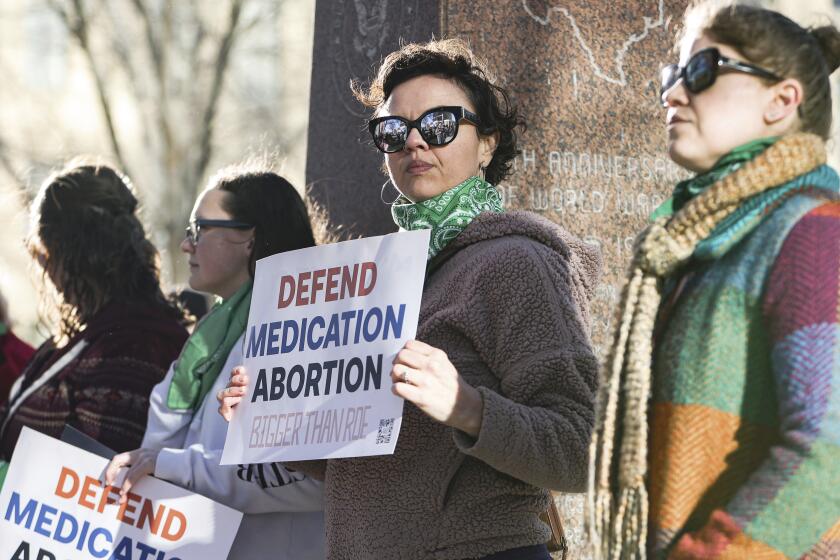Commentary: Opponents need to stop equating abortion with eugenics

- Share via
Among the dubious points that U.S. District Judge Matthew Kacsmaryk makes in his recent ruling suspending the Food and Drug Administration’s authorization of mifepristone is that abortion is part of the now-reviled practice of eugenics.
That clinical-sounding word refers to the appalling and scientifically incorrect theory that was promoted in the past by government and prominent civic leaders — and even the U.S. Supreme Court — to justify the forced sterilization of women and men deemed feeble-minded, mentally ill, criminal or poor to prevent them from bearing offspring who might sully the gene pool.
In his decision, now blocked by the Supreme Court, Kacsmaryk quoted a 2019 opinion by Supreme Court Justice Clarence Thomas noting that “abortion has proved to be a disturbingly effective tool for implementing the discriminatory preferences that undergird eugenics.”
Kacsmaryk’s reference to eugenics came out of the blue near the end of his opinion, apparently in response to a declaration from economist Jason Lindo — submitted as part of the government’s court filings — that taking easily accessed medication abortion pills off the market would make it more difficult for poor women to get an abortion, trapping them in a cycle of poverty.
“As a result of the impacts on their parents,” Lindo wrote, “these children are expected to do worse in school” and have “an increased likelihood of criminal involvement.”
The ruling ignores good sense, sound medical judgment and more than two decades of safe usage around the world. Mifepristone has been used safely in the U.S. for more than 20 years.
Of course, no government lawyer stood up in court and suggested women wanted to abort their pregnancies because they feared they would otherwise give birth to future criminals. Nor did the abortion opponents mention eugenics.
Kacsmaryk “is bringing it up to delegitimize access to abortion for anyone,” said UC Davis law professor Mary Ziegler, a historian of the U.S. abortion debate. “You’ll see more of that.”
Linking such an evil philosophy with abortion distorts everything about the personal right to control your own body and decide whether to terminate a pregnancy.
Kacsmaryk is obviously not the first judge or abortion opponent to raise the specter of eugenics as a reason to restrict or ban abortion. In addition to Thomas, conservative 7th U.S. Circuit Judge Frank Easterbrook warned in 2018 that using “abortion to promote eugenic goals is morally and prudentially debatable.” Both Thomas and Easterbrook were responding to a case challenging an Indiana ban on abortions for reasons of sex, race or disability diagnosis, which has since been struck down.
Before the Supreme Court overturned Roe vs. Wade last year, laws limiting abortion on the basis of sex, race or a diagnosis of a disability were one way lawmakers could chip away at access. Now they are moot, and states can just pass a total ban on abortion. But the idea that all abortions are a practice of eugenics will likely be embraced by abortion opponents pushing for national bans, Ziegler speculates.
Abortion opponents have resurrected the Comstock Act to falsely claim that medication abortion pills can’t be mailed out.
There is a long, horrible history of eugenics policies in the United States. Here in California, laws in effect from 1909 to 1979 allowed the forced or coerced sterilization of women and men who were considered mentally defective or were thought to have criminal tendencies. (Some 30 states would eventually have similar laws.) Particularly targeted were people of color and those who were poor.
The Nazis embraced the eugenics movement and even looked to California for ideas on how to implement it. Harry Chandler, publisher of the Los Angeles Times from 1917 to 1944, was a prominent supporter of the movement — something the paper has since acknowledged. And some supporters of reproductive rights in the first half of the 20th century, including Margaret Sanger, a pioneer of birth control, also believed in eugenics. The California Legislature in the last decade has approved reparations for survivors who were sterilized against their will.
But these are not the values of the reproductive rights movement of the 21st century, which has concentrated on empowering women to make their own choices. Contraception and abortion should be part of basic, undeniable healthcare. The fight for reproductive rights today is not about encouraging or forcing women to abort pregnancies as part of some governmental or societal effort to weed out possibly “defective” babies.
In fact, abortion bans are more akin to the old eugenics movement in that both rob women of their choice of whether to bear children, and fall disproportionately on poor women, particularly women of color, with the least resources to travel to get an abortion.
A woman should have the right to have — or not have — a baby for whatever reason she chooses. Any ban on abortion for a certain reason (aside from viability) is always someone else’s reason — a state’s, an organization’s, a nation’s. And that violates what should be a profoundly personal right to choose whether to continue a pregnancy or terminate it.
Rather than spending their time trying to outlaw abortion, lawmakers ought to focus on addressing the conditions that make some women seek to terminate their pregnancy: lack of affordable child care, a dearth of resources to support families taking care of severely disabled children, and jobs that pay too little to support a household, for example.
At a time when the antiabortion movement is looking for anything to help further its cause to end access to abortion everywhere, we should object when antiabortion activists, judges and lawmakers conflate the procedure with the eugenics movement, which was about coercion and intimidation.
The right to an abortion is just the opposite — the ability make a personal choice about one’s own body.
More to Read
A cure for the common opinion
Get thought-provoking perspectives with our weekly newsletter.
You may occasionally receive promotional content from the Los Angeles Times.













